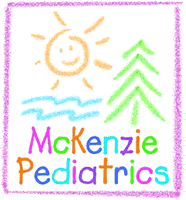Clean Hands Matter!
Dr. Todd Huffman, for the Eugene Register-Guard, September 2009
This week is National Clean Hands Week, sponsored by the Clean Hands Coalition (www.CleanHandsCoalition.org), a unified alliance of public and private partners working together to create and support coordinated and sustained initiatives to significantly improve health and save lives through clean hands.
Hand washing is the single most important thing we can do to keep from getting sick and spreading illness to others. It is important that as parents we model for our children cleaning hands before preparing food, before eating snacks and meals, after using the restroom, after handling garbage, after touching animals, after using facial tissues, after rubbing our nose, before and after treating a cut or wound, and whenever our hands are dirty.
Hygiene matters! All children from a young age should be taught the Four Basic Rules of reducing the spread of illness:
• Do not cough into your hands (cough into your elbow!);
• Do not sneeze into your hands (sneeze into your sleeve!);
• Wash your hands when they are dirty and before eating; and
• Do not stick your fingers into your eyes, nose, or mouth.
During cold and flu season, especially, teach your children not to get caught dirty handed! Great websites that help to teach children the basics of good hand washing, and of reducing disease spread, include Henry The Hand (www.henrythehand.com) and the Scrub Club (www.scrubclub.org). Parents are encouraged to check out www.washup.org.
Every year, more than 164 million school days are lost due to illness. Experts believe that a great many of these days could be reduced if children merely washed their hands properly and regularly. A recent study of school children found that youngsters who washed their hands four times a day had one-quarter fewer sick days due to respiratory illness, and only half as many sick days due to upset stomach!
School absences resulting from sick students and teachers are not only a nuisance, they can be expensive, too. Schools need to pay substitute teachers when the regular classroom teacher is sick, and teachers need to spend extra time and resources helping sick children catch up.
Parents are also affected because of lost work days due to having a child sick at home, not to mention the cost of visiting the doctor, if necessary. In these tight economic times, any extra effort that parents can make to reduce illness in their children will result in financial savings.
Frequent hand washing is a good idea for everyone. Consider how many surfaces you come in contact with every day that are shared with strangers: the pen in the checkout
aisle, the doorknob to the public restroom, the computer keyboard at the search terminal, and the handlebar to the grocery cart, to name just a few. Can you be certain the person who touched these items just before you washed their hands?
It is best to wash your hands with soap and clean running water for a minimum of 20 seconds, but preferably 60 seconds. Run your hands together to make a lather, and scrub all surfaces front and back. Consider singing the ABC song while lathering, and don’t rinse until you’ve sung the last note. Dry your hands using a paper towel or air dryer, if available.
If soap and water are not available, an alcohol-based hand sanitizer gel is a perfectly acceptable product to clean your hands. Alcohol rubs are fast-acting, and kill a significant number of germs on the skin. Apply the product to the palm of one hand, rub the hands together, and continue rubbing the product over all surfaces of the hands and fingers until they are dry.
To be effective, a hand sanitizer product must contain at least 60 percent alcohol. Unfortunately, there are products widely available with as low as 40 percent alcohol. In health care settings, such as clinics and hospitals, products are used containing 70 to 95 percent alcohol.
Alcohol rubs kill many different kinds of bacteria, including antibiotic-resistant bacteria, and many types of viruses, including the influenza virus and common cold viruses. Very few bacteria and viruses are resistant to a good hand sanitizer product.
And research has shown that hand sanitizers do not pose any risk by eliminating “good” germs on our skin. The body quickly replenishes the good germs on the hands, often moving them in from just up the arms where there are fewer harmful germs.
Children and their unwashed hands potentially can spread over one hundred different illnesses, especially during the fall and winter months. School students, and young children in daycare, are the most likely to wash their hands the least and carry the most germs. Not only do they spread germs to each other, they bring them home to their families.
Clean hands are critical at reducing the spread of colds, flu’s, stomach bugs, and skin infections. It’s up to parents to teach their children from a young age the importance of good hand washing. Make certain that every sink in the house is well-stocked with soap and hand sanitizer, and accessible to the child by way of a footstool. And make certain children know the Four Basic Rules of reducing the spread of illness – don’t let them get caught dirty-handed!
